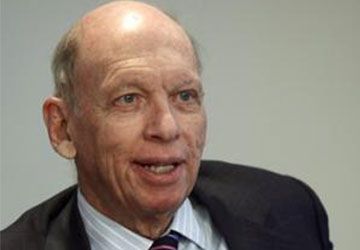 Byron R Wien, vice chairman, Blackstone Advisory Services, who has been giving his predictions about the US economy, financial market and politics since 1986, has unveiled his ten surprises for this year making 2010 the 25th year of his predictions.
Byron R Wien, vice chairman, Blackstone Advisory Services, who has been giving his predictions about the US economy, financial market and politics since 1986, has unveiled his ten surprises for this year making 2010 the 25th year of his predictions.
Mr Wien began the tradition in 1986 when he was the chief
The Surprises of 2010
1. The
2. The Federal Reserve decides the economy is strong enough for it to move away from a zero interest rate policy. In a series of successive hikes beginning in the second quarter, the Federal funds rate reaches 2% by year-end.
3. Heavy borrowing by the US Treasury and some reluctance by foreign central banks to keep buying notes and bonds drives the yield on the 10-year Treasury above 5.5%. Banks loan more to corporations and individuals and pull away from the carry trade, thereby reducing demand for Treasuries. President Obama says, “The suits are finally listening”.
4. In a roller-coaster year the Standard and Poor’s 500 rallies to 1,300 in the first half and then runs out of steam and declines to 1,000, ending where it started at 1,115.1. Even though the economy is strong and earnings exceed expectations, rising interest rates and full valuations present a problem. Concern about longer term growth and obligations to reduce leverage at both the public and private level unsettle investors.
5. Because it is significantly undervalued on a purchasing power parity basis, the dollar rallies against the yen and the euro. It exceeds 100 on the yen and the euro drops below $1.30 as the long slide of the greenback is interrupted. Longer term prospects remain uncertain.
6.
7. Believing he must be a leader in climate control initiatives, President Obama endorses legislation favourable for nuclear power development. Arguing that going nuclear is essential for the environment, will create jobs and reduce costs, Congress passes bills providing loans and subsidies for new plants, the first since 1979. Coal accounts for about 50% of electrical power generation, and Mr Obama wants to reduce that to 25% by 2020.
8. The improvement in the
9. When it finally passes, financial service legislation, like the healthcare bill, proves to be softer on the industry than originally feared. There is greater consumer protection, more transparency, tighter restriction of leverage and increased scrutiny of derivatives, but the regulatory changes for investment bankers and hedge funds are not onerous. Trading volume and merger activity increases; financial service stocks become exceptional performers in the
10. Civil unrest in
—